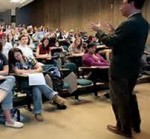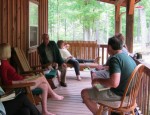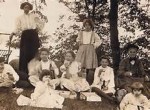Did yo u ever hear your child tell a friend about something and wonder how he managed to get all the facts wrong? Did you ever re-tell something at a family gathering and have your parent, your sibling, or your own child argue the facts -when you vividly remembered every detail?
u ever hear your child tell a friend about something and wonder how he managed to get all the facts wrong? Did you ever re-tell something at a family gathering and have your parent, your sibling, or your own child argue the facts -when you vividly remembered every detail?
For 40-something years, I carried resentment toward my mother over an incident that happened when I was in jr. high school. I felt she didn’t take my ‘side’ in an incident. Nobody was really in trouble over it. It was just an argument. But in jr. high, nothing was petty, you know? It turned out that I only knew part of the story. I didn’t know that she DID defend me. She went to the other child’s mother and the school and argued in my defense. She, too, had a lot of resentment over the incident, but because of the unfairness of the whole thing. We never discussed it before I was in my mid-fifties.
Before our discussion, I could have written about this in a memoir or an essay, presented myself as being wronged by my parent, and felt justified in doing so. Would it have truly been non-fiction? Is it a lie if the teller truly believes it?
Non-fiction is only facts from the reporter’s knowledge or point of view. Not everyone remembers the event the same way, or has the same opinion of the cause and effect, or the same educational information. Even history teachers remind us that what we know is based on someone’s reporting and is often discovered to be incorrect or biased as journals, letters, and other accounts come to light. There is much controversy over some of the American History we learned as children because of this.
Even fiction bases itself on what we know. The events we write around and the people we invent have roots in our knowledge of the era. It relies on our perception of things. Even the personalities of our characters are based on our own research, experience, and understanding. Speculative fiction creators have to be aware of Faction, and must decide whether they just want the audience that can totally go along for the ride when they create worlds that don’t act as our own, or offer reason/explanation for things and gather more followers. You see,even readers have pre-conceptions based on their own personal knowledge.
I attended a workshop in 2012 (link at bottom) that included writers of both  fiction and non-fiction. One night after dinner we sat in rockers on the front porch and discussed the blurring of the lines. One of the writers at the workshop said the foreword of his book, a memoir, states that this is the way HE remembers the events. That may be a cop-out, but at least he’s being truthful!
fiction and non-fiction. One night after dinner we sat in rockers on the front porch and discussed the blurring of the lines. One of the writers at the workshop said the foreword of his book, a memoir, states that this is the way HE remembers the events. That may be a cop-out, but at least he’s being truthful!
We tell our stories the way we see them. That’s what makes them unique and interesting, and often resonates with our readers. And it makes for great conversations at family reunions!
No matter if you write prose or poetry, children’s stories or songs, there is an event for you here. http://doebranchink.org/ It’s a wonderful getaway!








I agree, we often remember things differently from someone else, but you know what they say about witnesses to accidents and crimes. People see things from different physical perspectives and when you add the intellectual and emotional elements, it can get interesting. When my sister-friend and I compare notes on things, one of us may not even remember something that the other remembers vividly. Could be some faction going on there! (Also, I’m glad you and your mom talked about the specific incident so you could both have some closure, perhaps.)
Very good and clarifies a lot for those of who write fiction and faction.
Faction – I love this! I’ve thought about this topic quite a bit while writing my memoir. Great job summing it up.